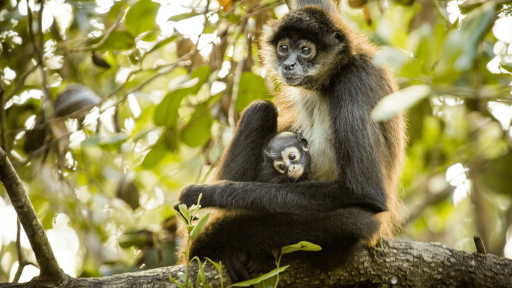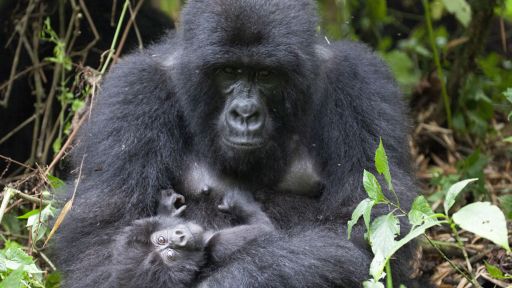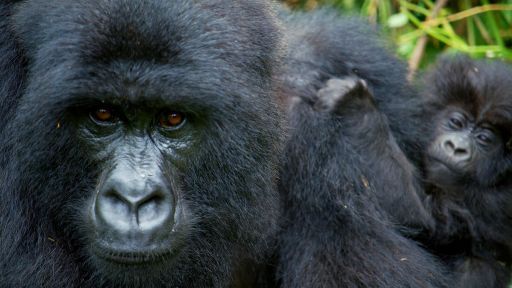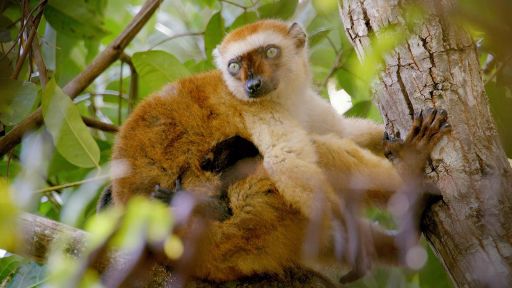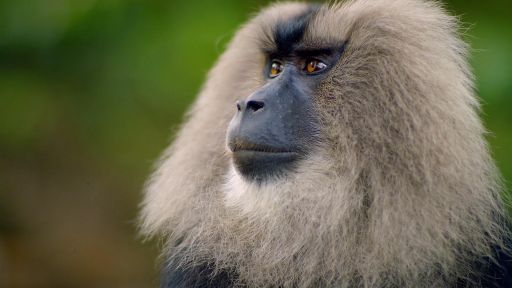TRANSCRIPT
♪♪ NARRATOR: One family... ♪♪ ...countless faces.
♪♪ Monkeys... ♪♪ ...lemurs... apes.
♪♪ A family that is found in almost every habitat on the planet.
♪♪ Each has its own unique strategy for survival.
♪♪ ♪♪ Meet the primates.
♪♪ [ Wind blowing ] ♪♪ NARRATOR: Virunga, Central Africa.
♪♪ These volcanic slopes are home to one of the planet's biggest primates.
♪♪ ♪♪ A silverback mountain gorilla.
♪♪ He's well over twice the weight of an average man... ♪♪ ...and over 4,000 times bigger than the smallest primate.
♪♪ ♪♪ His displays of strength keep intruders and challengers at bay... and him at the top.
It's no surprise gorillas have a fearsome reputation.
The silverback's aggression maintains order in gorilla family life.
♪♪ This male has been very successful.
He's ruled his group of 14 for six years.
♪♪ He's in the prime of his life.
But not everybody shows him the respect he deserves.
♪♪ ♪♪ [ Gorilla grunts ] ♪♪ ♪♪ ♪♪ ♪♪ There really is no escape.
♪♪ He's a climbing frame... a drum... ♪♪ ...a trampoline.
He's a jungle gym.
♪♪ But his tolerance could be a deliberate tactic.
The latest research shows that, for an alpha male, there's more to success than just aggressive displays of power.
♪♪ ♪♪ ♪♪ He's strong... ♪♪ ...but also gentle.
♪♪ Attentive... ♪♪ ...even playful.
♪♪ The females seem to find his softer side irresistible.
♪♪ Caring fathers raise up to five times as many infants.
♪♪ ♪♪ ♪♪ For primates, family matters.
♪♪ Across the world, there are over 500 different species of primates.
♪♪ And we're constantly discovering more about their diverse adaptations.
♪♪ Spider monkeys are born for a life in the highest canopy, with a tail that works like an extra arm.
♪♪ Howler monkeys, the loudest primate.
[ Howler monkey calling loudly ] In fact, one of the loudest animals on land.
♪♪ The strange aye-aye has a unique, bony middle finger so sensitive it can locate grubs hidden in the tree trunks.
♪♪ Colorful forest monkeys... ♪♪ acrobatic urban residents.
♪♪ Primates come in all shapes and sizes.
♪♪ ♪♪ The canyons of Northeast Brazil.
♪♪ Home to one of the world's smartest monkeys.
♪♪ ♪♪ Bearded capuchins.
♪♪ This large troop of 40 sleeps in the caves at the top, safe from predators.
♪♪ ♪♪ But that means they have a daily descent of over 600 feet just to find anything to eat.
♪♪ ♪♪ It's the peak of the dry season.
There's been no rainfall for 8 months.
[ Monkey sniffs ] There is some food here.
Lizards are a source of protein and water.
But to catch them, you need to be smart.
[ Tapping ] ♪♪ Capuchins have mastered a skill few other animals have.
♪♪ They make and use tools... ♪♪ ...tailor-made for every job.
♪♪ ♪♪ These sticks are perfect for hunting in crevices.
♪♪ And capuchins will tackle pretty much anything edible, stinger and all.
[ Capuchins trilling ] But they have an even more ingenious strategy that gives them access to a superfood.
Wild cashews.
The nuts inside are rich in fats and minerals, but the shells are almost impossible to break into... unless you're a capuchin.
[ Capuchins chittering ] ♪♪ ♪♪ The adults make it look easy.
♪♪ ♪♪ By age 5, this youngster has learned the basics.
♪♪ But that hammer's too small.
♪♪ That's a better size, but... he's still got to get the angle just right.
♪♪ ♪♪ ♪♪ Finally!
♪♪ ♪♪ No capuchin is born with these abilities.
They have to be learned, passed down from generation to generation.
We've recently discovered that capuchins have been using stone tools here for at least 3,000 years.
And this is one of the key reasons why they can survive in such an inhospitable environment.
By living together, family groups can teach one another how to survive.
And when it really counts, they also back each other up.
♪♪ A yellow baboon is on the run.
♪♪ ♪♪ Somehow, he's escaped the leopard's first attack.
But the cat is still on his trail.
His hope is that he won't be discovered.
♪♪ [ Leopard growling ] ♪♪ ♪♪ ♪♪ ♪♪ ♪♪ The game is up.
♪♪ Baboons can elude most predators in the trees.
But not a leopard.
♪♪ ♪♪ [ Calling in distance ] ♪♪ Fortunately, this baboon has got backup.
[ Leopard growls ] [ Baboons calling ] ♪♪ His family.
Yellow baboons are one of the few animals that dare to challenge a leopard.
♪♪ [ Baboons grunting ] ♪♪ The boldest males try to distract the attacker.
[ Baboons call ] But the leopard is relentless.
♪♪ [ Baboons call ] ♪♪ ♪♪ [ Calling continues ] ♪♪ ♪♪ [ Leopard growls ] [ Body thuds ] [ Calling continues ] The fall leaves him injured and disoriented.
♪♪ But he might just have a chance... [ Baboons calling ] ...if the leopard can be kept at bay.
[ Calling continues ] His family is not backing down.
♪♪ [ Leopard growls ] They'll hold the leopard here for as long as they can.
♪♪ ♪♪ Remarkably, this baboon has survived his ordeal.
Thanks to his family's bravery.
♪♪ [ Baboons calling ] ♪♪ ♪♪ The secret to baboon success is that they work together.
♪♪ [ Thunder rumbles ] Primates are excellent collaborators, but they will also turn to ruthless exploitation, if it can give them an edge.
♪♪ ♪♪ And there are few sneakier than these lion-tailed macaques.
♪♪ ♪♪ Here in Southern India, monsoon rains bring on jackfruit season.
♪♪ These enormous, 22-pound hulks are the largest tree fruit in the world -- a feast.
But until they're ripe, they remain completely inedible.
The macaques, unfortunately, find it hard to tell which ones are ready to eat.
Luckily, help is at hand.
♪♪ These giant Malabar squirrels have a keen sense of smell, which leads them to the ripest fruits.
[ Squirrel chitters ] The macaques watch the squirrels' every move.
♪♪ Then they try to muscle in.
♪♪ ♪♪ ♪♪ ♪♪ ♪♪ ♪♪ ♪♪ When the squirrels hold their ground... the macaques have another trick to get their ripe fruit to-go.
They know that the squirrels won't follow them down to the ground.
This tactic gives the monkeys access to the pick of the bunch.
♪♪ The squirrels do get their turn eventually.
♪♪ Although, even then, the macaques can't seem to let them enjoy their share in peace ♪♪ ♪♪ ♪♪ Across the Indian Ocean is Madagascar... ♪♪ ♪♪ ...land of the lemurs.
♪♪ They live nowhere else.
♪♪ [ Lemur calls ] [ Lemurs calling ] Isolated for millions of years, they've evolved into more than a hundred different species, making up a fifth of all primates.
♪♪ [ Lemur snoring ] In the northwest of the island, soaring daytime temperatures mean it's siesta time... [ Lemur snoring ] ...for a family of blue-eyed black lemurs.
Although, only the males are black.
The females are brown... but still blue-eyed.
Every female is carrying an infant.
They're in the midst of their seasonal baby boom.
The adults snatch any opportunity for a rest.
♪♪ But the infants have other ideas.
♪♪ ♪♪ The males can slip away for peace and quiet.
♪♪ But the females are left to deal with boisterous youngsters.
[ Baby lemurs squeal ] ♪♪ ♪♪ ♪♪ At a month old, the infants still rely on their mothers for milk... and their daily wash. Like many primates, lemurs are prone to ticks and other parasites.
But as well as grooming each other... this group has developed a more ingenious means of keeping pests at bay.
♪♪ Self-medication.
When these carpenter ants feel under attack, they spray formic acid, which the lemurs put to good use.
♪♪ This behavior has only just been discovered... but it seems that rubbing this acid, mixed with a bit of spit, onto their fur acts as an effective "tick repellent."
♪♪ ♪♪ They've learned to access their own jungle pharmacy.
♪♪ The only possible side-effect seems to be... yet more drowsiness.
♪♪ Luckily, this time the youngsters are also ready for a rest.
♪♪ ♪♪ Or maybe not.
♪♪ [ Waves crashing ] Isolated off Africa's west coast is the tropical island of Bioko.
♪♪ ♪♪ It's one of the last strongholds... of perhaps the least-known primate in the world.
♪♪ A shy forest monkey that rarely ventures out in the open, unless there's good reason.
♪♪ [ Monkey grunting ] ♪♪ ♪♪ Scientists think this is a candidate for the largest monkey in the world.
But so few have been studied, no one's sure.
This is a drill.
A battle-scarred male.
He's past his prime and now pretty much toothless.
Getting into this bounty is going to be hard.
Kicked out of the family group, he's forced to live out his final years alone.
Combing the beach for food.
♪♪ Deep inside the forest.
♪♪ Things couldn't be more different.
♪♪ For the rest of the troop, a giant fruiting tree provides more than enough for everyone.
♪♪ A group that might be 50 strong.
♪♪ [ Drills chittering, grunting ] Drill society is ruled by alpha males in peak condition.
♪♪ Adult males that can't compete are not tolerated.
♪♪ This old male is now an exile.
And he's not the only one keeping a low profile.
♪♪ A much younger male, not ready to be an alpha, is skulking around the beach.
[ Drill chuffs ] ♪♪ And he's showing off something the old boy is lacking.
Massive canine teeth.
♪♪ The youngster puts them to work on the coconut.
♪♪ That's how it's done!
♪♪ ♪♪ To survive as a toothless outcast, the old male has adopted a new strategy.
♪♪ Scavenging.
♪♪ ♪♪ It's still a bit of a mouthful... ♪♪ ...but it seems an old drill can learn new tricks.
♪♪ ♪♪ Adaptability and resilience are primate hallmarks.
♪♪ [ Thunder rumbles ] ♪♪ In the wet season in the Amazon, the entire forest is swamped by floodwater.
♪♪ But there's one bizarre monkey that takes it all in its stride.
The bald-headed, white uakari.
♪♪ ♪♪ These seed and fruit-eating specialists must constantly change and adapt their diet, season by season.
♪♪ This also means they must spend more of their day on the move than any other monkey.
♪♪ ♪♪ Finding enough to eat keeps them constantly roaming, suspended above the floodwaters, through this tangled canopy maze.
♪♪ ♪♪ In the dry season here in Senegal, a chimpanzee troop can survive thanks to their elders' memory of hidden water supplies... in every corner of their territory.
♪♪ ♪♪ Lifesaving knowledge they pass on to the next generation.
[ Monkeys screeching ] Snub-nosed monkeys in China survive higher than any other wild primate.
[ Monkey calls ] Up to 15,000 feet.
They're well-adapted to the thin air found at this altitude.
And their snub noses aren't prone to frostbite in the freezing cold.
[ Monkey calls ] Such adaptations allow primates to exploit the most unexpected opportunities.
[ Insects chirping ] Winter in South Africa.
As the sun sets, the night shift starts to stir.
♪♪ Bushbabies are rather different-looking primates.
[ Bushbabies chittering ] ♪♪ ♪♪ And being nocturnal, they're more often heard than seen.
[ Elephant trumpets ] For their size, they have the largest ears of any primate, which tune in to the sounds of the African night.
[ Elephant trumpeting ] It's a jungle out there... ♪♪ Well, almost.
♪♪ [ Tiger growls ] ♪♪ This is Pretoria Zoo.
[ Insect buzzing ] But these bushbabies are wild.
[ Creatures calling ] Although it might seem a dangerous place for an animal that could fit in a pint glass, there is something in these zoo gardens that, for a bushbaby, is irresistible.
They usually catch insects on the wing, but in winter, there aren't enough insects around.
What they really want is nectar.
To get it, they've learned to find their way around the zoo, all 200 acres of it.
♪♪ And they have an unusual trick to help them.
They smear sticky drops of urine onto their hands and feet to leave a scent trail and to give them extra grip... ♪♪ ...before they jump to lightspeed.
♪♪ ♪♪ Elastic tendons in their legs act like catapults, firing them 10 times their body length.
♪♪ A bushbaby needs to be careful.
Cats, snakes, and owls, would all make a meal of them.
♪♪ Good thing that, here, most of the hunters are safely behind bars.
♪♪ Even so, this bushbaby's smart enough not to hang around.
♪♪ ♪♪ At last.
Jackpot!
Bird of Paradise flowers.
These native plants grow in abundance here, and they're full of syrupy nectar.
A high-energy drink that will keep this bushbaby fueled all night.
[ Vehicle approaching ] When feeding time's over bushbabies can also precisely retrace their scented urine trails back to the family nest.
♪♪ Until they head back to the zoo again tomorrow.
♪♪ For many primates, living alongside humans is a challenge.
But it's a skill that at least one family has mastered -- the macaques.
♪♪ They are the widest spread group of monkeys, ranging across Asia, North Africa, and Southern Europe.
♪♪ These long-tailed macaques in Thailand have learned to pluck human hair to use as dental floss.
♪♪ WOMAN: Hey!
NARRATOR: And this population in Bali has gone one step further.
[ Macaque screeches ] They've learned to barter... ♪♪ ...only giving up their loot in exchange for the highest value foods.
♪♪ ♪♪ But there is one place where the relationship is very different.
It's cherished.
♪♪ One of the most sacred sites in Kathmandu's City of Temples is Swayambhunath stupa.
♪♪ ♪♪ A troop of rhesus macaques joins the throng of early morning worshipers, looking for food.
♪♪ But here, the macaques don't need to steal.
They simply take their positions and wait.
♪♪ ♪♪ ♪♪ These monkeys are worshipped as gods.
♪♪ ♪♪ They have charmed us and take full advantage of our adoration.
Once they're full, the group has time to relax.
♪♪ ♪♪ ♪♪ ♪♪ But it isn't long before the youngsters start to get bored.
♪♪ ♪♪ ♪♪ ♪♪ [ Macaque screeches ] [ Water splashes ] ♪♪ ♪♪ And of course, once one goes in, they all want to take the plunge!
[ Macaques screeching ] ♪♪ They seem to double-dare one another to increasingly outlandish leaps.
♪♪ ♪♪ ♪♪ Finally, the Senior Swim gets their chance to cool off.
♪♪ ♪♪ But the old girls do make a rather irresistible target.
♪♪ ♪♪ ♪♪ ♪♪ This temple troop is thriving.
♪♪ ♪♪ In a world increasingly shaped by humans... ♪♪ exploiting their revered status is the ultimate strategy for survival... ♪♪ ...making these rhesus macaques... ♪♪ ...one of the most successful members... ♪♪ ...of this extraordinary animal family.
♪♪ ♪♪ Next time... Family is everything for the primates.
Every triumph is shared and every drama, too.
Discover how this remarkable family conquered the planet working together.
"Nature's" landmark three-part series continues.
Across the world, family, power, and social living are key to primate success.
They share knowledge, forge alliances, and protect each other.
Family really matters to the primates.
JAIN: Ooh-whee!
♪ Makeba, makes my body dance for you ♪ To order this "Nature" program on DVD, visit shopPBS or call 1-800-PLAY-PBS.
This program is also available on Amazon Prime Video.
♪♪ ♪♪ ♪♪ ♪♪ To learn more about what you've seen on this "Nature" program, visit pbs.org.
♪♪


